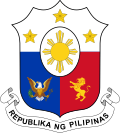| 11th Congress of the Philippines | |||||
|---|---|---|---|---|---|
| |||||
 | |||||
| Overview | |||||
| Term | July 27, 1998 – June 8, 2001 | ||||
| President |
| ||||
| Vice President |
| ||||
| Senate | |||||
| Members | 24 | ||||
| President |
| ||||
| President pro tempore |
| ||||
| Majority leader |
| ||||
| Minority leader |
| ||||
| House of Representatives | |||||
| Members | 257 | ||||
| Speaker |
| ||||
| Deputy Speakers |
| ||||
| Majority leader |
| ||||
| Minority leader |
| ||||
 |
|---|
The 11th Congress of the Philippines (Filipino : Ikalabing-isang Kongreso ng Pilipinas), composed of the Philippine Senate and House of Representatives, met from July 27, 1998, until June 8, 2001, during the 31-month presidency of Joseph Estrada and the first four months of Gloria Macapagal Arroyo's presidency. The convening of the 11th Congress followed the 1998 national elections, which replaced half of the Senate membership, and the entire membership of the House of Representatives. The Estrada impeachment was the highlight of the 11th Congress.









